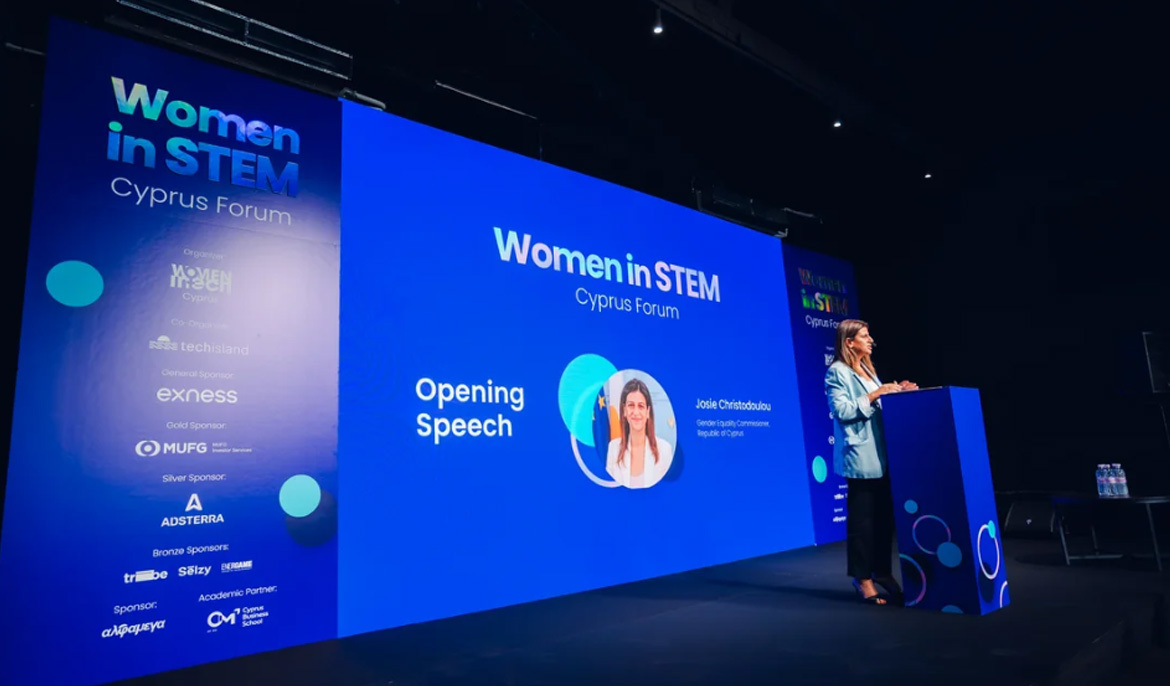At the opening of the Women in STEM Cyprus Forum in Limassol, Commissioner for Gender Equality Josie Christodoulou, acknowledged Cyprus’ progress on gender equality, despite ranking 21st among the 27 EU Member States.
The Forum, organised by Women in Tech and TechIsland to mark Ada Lovelace Day, aimed to empower women in Science, Technology, Engineering, and Mathematics (STEM) and drew attention to the ongoing global challenges of gender representation in these fields.
Celebrating Lovelace, an English mathematician considered the first computer programmer, Christodoulou highlighted her pioneering role, stating that such historic achievements should inspire future generations to pursue STEM careers.
Christodoulou said, “Cyprus currently ranks 21st among the 27 EU Member States,” but added that its “gradual progress in this area is recognised internationally.”
She also cited reports from the UN and the World Economic Forum. “The UN’s 2024 report on Gender Equality and the 2030 Sustainable Development Goals,” she mentioned, “ranks Cyprus 39th globally,” adding that the country is making “steady progress towards achieving the 2030 goals.”
Moreover, the World Economic Forum’s 2024 report upgraded Cyprus’s position from 106th to 86th. “These reports provide us with the tools to improve,” she said.
Discussing the persistent under-representation of women in STEM and men in fields such as education and health, Christodoulou explained that “gender stereotypes largely influence the choices and career aspirations of girls and boys.”
She attributed this trend to societal and educational factors, though acknowledged that “this is slowly changing in the STEM fields in Cyprus as well.”
Eurostat data from 2022 shows that 44 per cent of science and engineering roles in Cyprus were held by women, while women made up 19.4 per centt of the Information and Communication Technologies sector in 2023.
Christodoulou also stressed the need for women’s active involvement in technology, citing concerns over artificial intelligence and online sexism.
She observed that AI systems are built on datasets which reflect societal biases, making it likely that “these systems will reproduce and maintain biases.”
Furthermore, she explained that “algorithms often fail to adequately identify and mitigate sexist content.”
Increasing female participation in STEM could, she suggested, “influence the development of tools and algorithms designed to combat sexism.”

The ‘National Strategy for Gender Equality 2024-2026’ addresses these issues, with initiatives that include digital training and financial literacy programmes for rural women, alongside targeted research and innovation policies.
Additionally, Christodoulou outlined steps aimed at work-life balance, such as “increasing child and adult care infrastructure, extending maternity leave, starting pre-school education from the age of four and phasing in full-day schooling.”
Reflecting on a broader mission, she emphasised the importance of an environment that enables girls and boys to “shape their future based on their skills and interests,” with equal access to resources.
She concluded by stressing the “critical need for collaboration between the state and the private sector to achieve impactful results in gender equality.”


